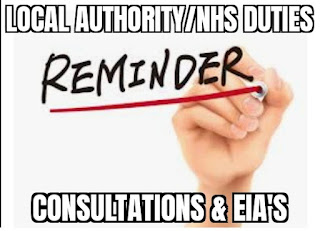Reminders for Authorites on EIA's & Consultations
In light of examining three or four different Equality Impact
Assessments and seeing some glaring gaps i thought it important to try and remind
authorities and highlight, how the process of Equality consultation works at
present, the downfalls of the system and how in reality it should work.
There are a number of laws under NHS and Local
Authority legislation which require when a process, policy, or procedure
whether written or unwritten is brought in to place or changed, that has the
chance of having an effect on local communities require consultations to take
place. The ideas behind it is quite rightly meant to be that the people,
not the managers, councillors or politicians can have a say on the impact that
this may have on their community.
The main piece of legislation that I will
concentrate on is the Equality Act 2010. The main provisions relating to the
requirement to consult comes from section 149 the Public Sector Duty of the Act
which states, that those in the public sector and those associated with
them must have "due regard" to;
Eliminating unlawful discrimination, harassment
and victimisation and other conduct prohibited by the Act.
Advance equality of opportunity between people
who share a protected characteristic and those who do not.
Foster good relations between people who share a
protected characteristic and those who do not.
So when a procedure process or policy has the
potential of effecting any of the relevant protected characteristics under the
act the authority must consider the effects of the policy change.In order to do
this the courts through previous cases have decided (known as the Gunning
principles) that having due regard means that the
following should happen;
1. Issues are to be considered at the start.
2. People involved in the consultation need to
have the necessary information to consider the effects of the decision
(known and carried out usually through an Equality Impact Assessment).
Both how positive and negative impacts the decision will have. If negative how
these will be mitigated.
3. Adequate time for consideration and response
is given
4. The people making the final decision must be
aware of the views of the people’s views and use the information in making the
decision.
Now this doesn’t mean that the authority can’t
make unfavourable decision. It just means that it needs to consider the
options, talk to the people and take those views in to consideration. If this
doesn’t happen anyone has the right to request a Judicial Review of the process.
Having worked for the Local Government,
and since running the local disability user led organisation, Lincolnshire
Independent Living, and currently running an independent voluntary advocacy service, I have gone
through many consultations and often find them lacking in due regard.
They in my opinion fail regularly for exactly
the four reasons given above. Yes it’s a legal requirement and they’ll do a
consultation (most of the time), but likely or not most decisions are already
made. This is obvious as most do not have impacts carried out at the beginning
(the excuse used these days is it’s a live document). Having sat through a
number of scrutiny meetings. The powers that be never even look at the EIA.
Even when they are specifically asked to do just that.
Even after all this you'd think lots of
concerned people would be bringing challenges through the courts, but with the
cuts in legal aid and judicial reviews happening at a high level, it is a
costly endeavour. Most people will therefore never consider it.
More importantly though thus is the rule of law, our society has always been ruled by this system, its worked for years. It concerns me further that the Goverenment via the proposed bill of rights is working to get rid of this oversight. So much so that challenges are being considered through both the European courts and the legal profession putting in complaints to the United Nation expressing concerns as to their concerns over our rule of law and our basic rights, to hold authorities to account.



Comments
Post a Comment